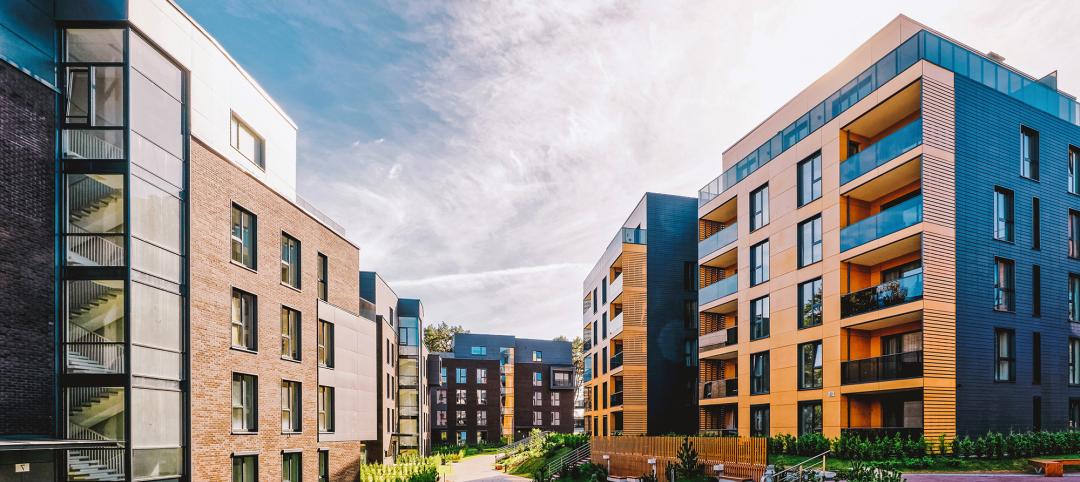Architecture firms are pursuing transparency and disclosure en route to achieving high sustainability ratings for their clients’ buildings.
“Transparency and healthy materials is one of the hottest topics in the green building industry,” says SERA Architecture’s Lisa Petterson, AIA, LC, LEED AP BD+C. “We are seeing more and more emphasis on actual rather than predicted performance.”
With partners Lucid and Enmetric, SERA is studying plug load use in its own Portland, Ore., office, to see how to save energy. A previous research project on water savings in actual projects led to regulatory changes in Oregon.
VOA Associates is developing post-occupancy surveys to collect building performance data. “This will help us understand human interaction on specific buildings and building types, to inform future projects and help us create better, healthier built environments,” says VOA Sustainability Leader Susan Heinking, AIA, NCARB, LEED AP O+M.
To get a better handle on real performance numbers, HDR Architecture has developed two metrics: the Sustainable Return on Investment (SROI), which computes a dollar-based measure of project goals in reducing energy, water, and waste; and the Sustainability-adjusted Life Cycle Cost Analysis (SLCCA), which evaluates the full cost of design decisions so that benchmarks can be developed for sustainable design decisions.
As a firm that does work all over the world, Gensler has to be attuned to many different climates; hence its use of design performance analysis software at the beginning of virtually all projects, says Kirsten Ritchie, PE, LEED AP O+M, the firm’s Sustainable Design Director. “We develop early conceptual designs and use building simulation software to measure design impacts on energy, carbon, water, and daylight,” she says. “This enables us to make design decisions that ‘tune’ our building performance.”
Firms are finding, however, that energy modeling, while usually helpful, is not an end in itself. “It narrows the universe of options really quickly and helps us make the right moves as early [in design] as possible,” says Heather Holdridge, Assoc. AIA, EIT, LEED AP BD+C, Sustainability Coordinator with Lake|Flato Architects. “It helps us to set some clear goals early in the process.”
At Cannon Design, project teams have a proprietary design tool at their fingertips—it’s called Material LIFE—that enables them to compare construction systems and materials from cradle to gate. According to Sustainability Director Rand Ekman, AIA, LEED Fellow, this process allows designers to choose materials that not only reduce global energy use but also have a positive life cycle impact.
MINING FOR PRECIOUS GOLD—AND MORE
More and more architecture firms are pushing higher and higher on the sustainability ladder.
For example, PGAL has executed numerous high-LEED projects in recent years: the net-zero-ready Bachelor Enlisted Quarters at Marine Corps Air Ground Combat Center, Twentynine Palms, Calif., awaiting Platinum certification; Gold-certified Innovation Village Apartments at Florida Atlantic University; the $42 million U.S. Federal Courthouse, Fort Pierce, Fla., awaiting Gold certification; and two transport projects seeking LEED Gold—the Consolidated Rental Car Facility at Boston’s Logan International Airport and the Regional Intermodal Transit Center at Bob Hope Airport, Burbank, Calif.
Globetrotting firm RTKL recently earned LEED Gold for the Mirdif City Centre, a 230,000-sf mall with parking for 7,000 cars, in Dubai. Another LEED project, the 135,000-sf Mall of Egypt, in Cairo, was also completed for client Majid Al Futtaim Properties. Closer to home, RTKL gained LEED Gold for the 21,000-sf White Oak Wonders, a child care center on the campus of the Food and Drug Administration headquarters in White Oak, Md.
WD Partners, a leader in green retail design, emphasizes the ongoing investment value of sustainability to clients like grocers Whole Foods, Price Chopper, and Fresh & Easy. The firm collaborated with UTC Power on the installation of a 400-kW fuel cell at a Stop & Shop in East Torrington, Conn., that provides 95% of the store’s electrical needs; the store’s total utility bills have been trimmed in half in the last two years.
WD Partners has also contracted with the U.S. Energy Department’s Pacific Northwest National Lab to develop the next-generation Home Depot retail outlet—one that will cut energy use 50%.
Design firms are also widening their green service capabilities. Atkins has launched a retro-commissioning business, based in Fort Myers, Fla., to capture some of the potential $1.8 billion that Pike Research projects will propel the retro-Cx market by 2014.
Firms are also stretching their goals. Net-zero energy is no longer the impossible dream, as the Health Professions & Student Services Building at North Shore Community College, Danvers, Mass., demonstrates
The three-story, LEED Gold building uses a 50-well geothermal system, chilled beams, and a tight building envelope to reduce energy consumption, and roof-mounted PVs to generate the power needed to make the building net-zero for energy. DiMella Shaffer Associates (designer) and Walsh Brothers (CM) headed the team.
On the green horizon: PNC Bank Headquarters, under design by Gensler and Buro Happold (SE, MEP, modeling consultant). The client for this $400 million, 800,000-sf tower, PNC’s Gary Saulson, has publicly defined his “modest” demands—to make it the “greenest high-rise building in the world,” with the lowest predicted energy use intensity. We’ll find out how well the Building Team did to meet these goals in about three years. +
Related Stories
3D Printing | Apr 11, 2023
University of Michigan’s DART Laboratory unveils Shell Wall—a concrete wall that’s lightweight and freeform 3D printed
The University of Michigan’s DART Laboratory has unveiled a new product called Shell Wall—which the organization describes as the first lightweight, freeform 3D printed and structurally reinforced concrete wall. The innovative product leverages DART Laboratory’s research and development on the use of 3D-printing technology to build structures that require less concrete.
Market Data | Apr 11, 2023
Construction crane count reaches all-time high in Q1 2023
Toronto, Seattle, Los Angeles, and Denver top the list of U.S/Canadian cities with the greatest number of fixed cranes on construction sites, according to Rider Levett Bucknall's RLB Crane Index for North America for Q1 2023.
University Buildings | Apr 11, 2023
Supersizing higher education: Tracking the rise of mega buildings on university campuses
Mega buildings on higher education campuses aren’t unusual. But what has been different lately is the sheer number of supersized projects that have been in the works over the last 12–15 months.
Contractors | Apr 10, 2023
What makes prefabrication work? Factors every construction project should consider
There are many factors requiring careful consideration when determining whether a project is a good fit for prefabrication. JE Dunn’s Brian Burkett breaks down the most important considerations.
Mixed-Use | Apr 7, 2023
New Nashville mixed-use high-rise features curved, stepped massing and wellness focus
Construction recently started on 5 City Blvd, a new 15-story office and mixed-use building in Nashville, Tenn. Located on a uniquely shaped site, the 730,000-sf structure features curved, stepped massing and amenities with a focus on wellness.
Affordable Housing | Apr 7, 2023
Florida’s affordable housing law expected to fuel multifamily residential projects
Florida Gov. Ron DeSantis recently signed into law affordable housing legislation that includes $711 million for housing programs and tax breaks for developers. The new law will supersede local governments’ zoning, density, and height requirements.
Energy Efficiency | Apr 7, 2023
Department of Energy makes $1 billion available for states, local governments to upgrade building codes
The U.S. Department of Energy is offering funding to help state and local governments upgrade their building codes to boost energy efficiency. The funding will support improved building codes that reduce carbon emissions and improve energy efficiency, according to DOE.
Architects | Apr 6, 2023
New tool from Perkins&Will will make public health data more accessible to designers and architects
Called PRECEDE, the dashboard is an open-source tool developed by Perkins&Will that draws on federal data to identify and assess community health priorities within the U.S. by location. The firm was recently awarded a $30,000 ASID Foundation Grant to enhance the tool.
Cladding and Facade Systems | Apr 5, 2023
Façade innovation: University of Stuttgart tests a ‘saturated building skin’ for lessening heat islands
HydroSKIN is a façade made with textiles that stores rainwater and uses it later to cool hot building exteriors. The façade innovation consists of an external, multilayered 3D textile that acts as a water collector and evaporator.
Multifamily Housing | Apr 4, 2023
Acing your multifamily housing amenities for the modern renter
Eighty-seven percent of residents consider amenities when signing or renewing a lease. Here are three essential amenity areas to focus on, according to market research and trends.
















